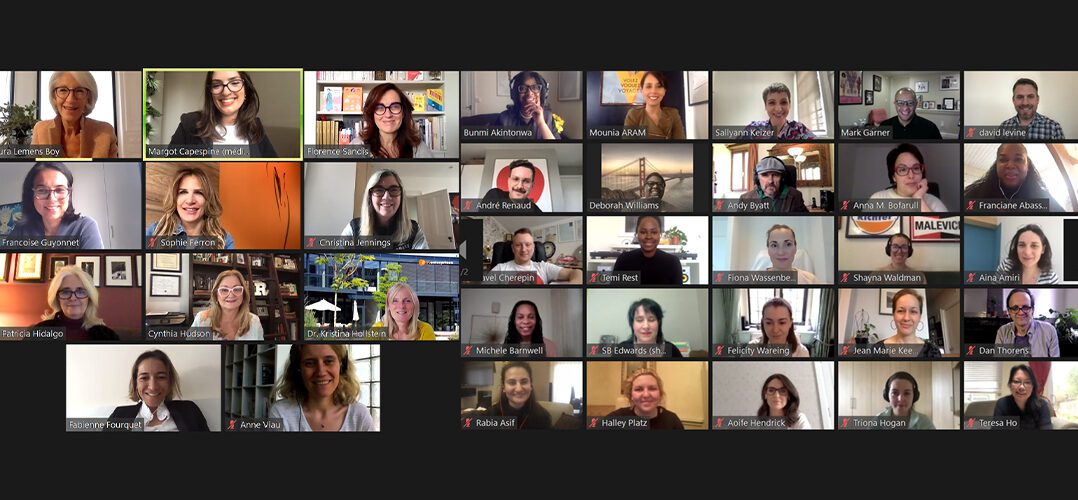The recipient of the MIPDrama Coup de Coeur for 2021 is Agatha Christie’s Sven Hjerson, developed and produced by B-Reel Films. The show was selected as the winner by international buyers, beating off tough competition from an eclectic mix of international selections.
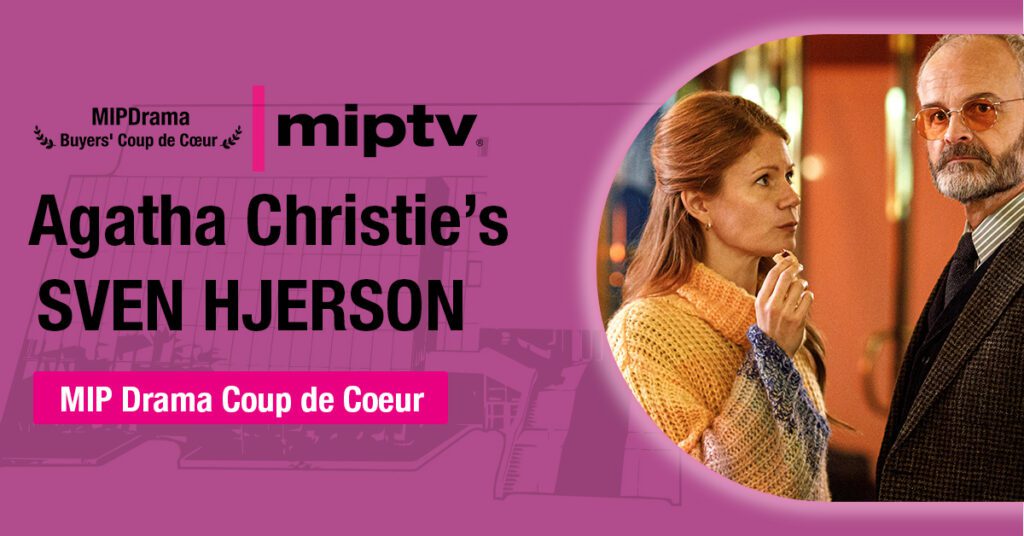
Starting on day one of Digital MIPTV, the seventh annual MIPDrama gave buyers an exclusive first look at a curated selection of the most anticipated series in production around the world. Eleven shows and series were selected for the event by the MIP Markets’ Buyers Advisory Board – and then presented to buyers by actress Josephine Draï. Among the eleven were projects from Belgium, Canada, Germany, Italy, Russia, Spain, Sweden and the UK, which was home to three dramas. There were also co-productions from France/Switzerland and Germany/Norway.
The most prominent genres in the pool included crime, thriller, comedy and period.
Narrowing the MIPDrama selection down to just 12 productions was tough, Draï said, “because so many submissions were exceptional in their creativity, production values and quality of storytelling”. Choosing a winner proved just as difficult, with two titles in particular catching buyers’ attention. In the end, 34% of buyers who voted selected the B-Reel show, which has been backed by TV4 Sweden. The completed production will be the first time that Christie’s retired criminal investigator Hjerson has been adapted to the screen.
Diversity & Inclusion: « We All Have to Move Forward Together »
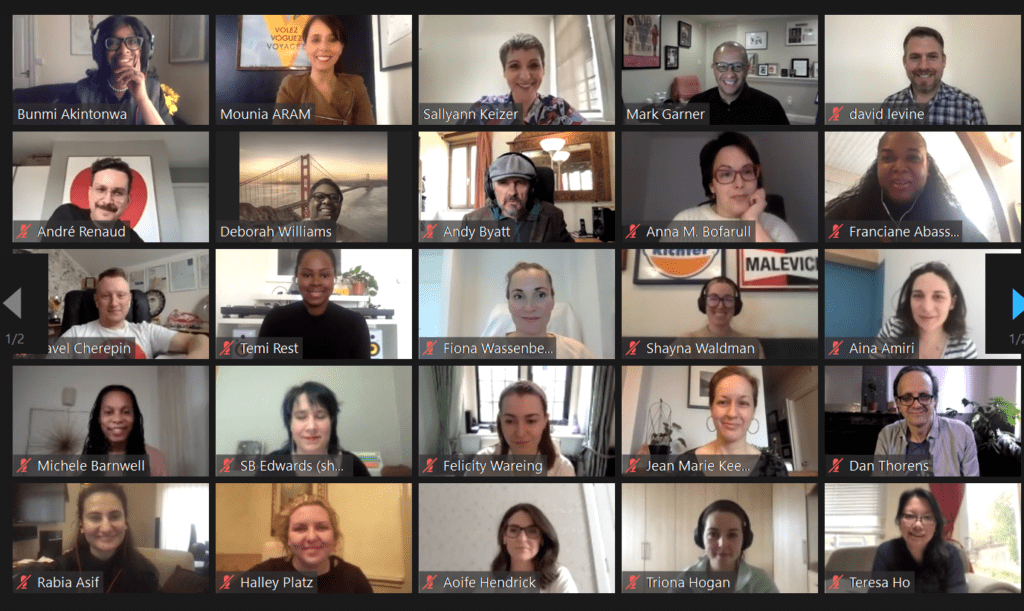
During the Diversity & Inclusion Mentoring Session on the final live day of Digital MIPTV, seven industry figures hosted a series of round-table discussions on relating to diversity and inclusion in front of, and behind the camera.
In her session on Truth To Power, Deborah Williams, CEO, Creative Diversity Network, said “the idea of speaking truth to power and challenging those who you rely on for your day-to-day job, is difficult”. In the past, to tackle this issue, Williams said she “would adapt different personas for different situations”. It’s also important to “choose your battles”, she added.
Mounia Aram, Founder and President, Mounia Aram Company, hosted a session on Breaking The Double Glass Ceiling. One issue her group tackled during the session was “imposter syndrome”, feelings of inadequacy or shyness that make you feel you’re not good enough for the role you have taken on. Giving this some context, she shared her stories about growing up in Morocco and then moving to France and “setting up a company with my name on it”.
André Renaud, Senior Vice-President, Global Format Sales, at BBC Studios, host of the session Being Your Authentic Self: Bringing Inclusion Into The Everyday, said it was important to “have a wide reach when we are recruiting”. Also, “leaders must demonstrate their support for diversity”.
Bunmi Akintonwa, CEO, Little Black Book Company, hosted a session on Diversity and Inclusion and Time Travelling, which looked to where the industry might be several years down the line where diversity and inclusion are concerned. “Sometimes we have to look at ourselves,” she said, “because sometimes the solution may be within us.” But, “We concluded that we have to keep these conversations going and it’s important that we go forward together. And if we all work together as a group, we will achieve a more diverse future.”
Other round-table discussions included: How Do We ‘Usualise’ LGBTQ+ Characters in Themes and in Content Across Genres And Markets? hosted by David Levine, Chief Content Officer at the UK’s Moonbug Entertainment; and DEI and Authenticity in Children’s Content, hosted by Sallyann Keizer, Managing Director, at the UK’s Sixth Sense Media.
Women’s Mentoring: « If we want the industry to change, it’s up to us »
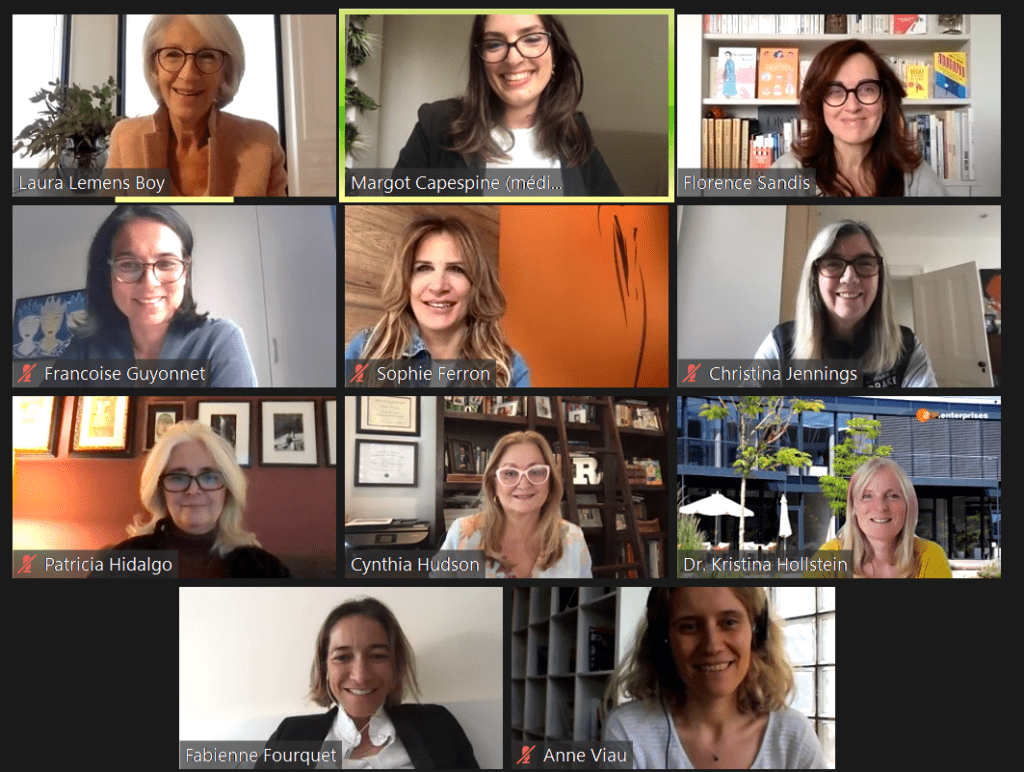
The Fifth International Mentoring & Networking Event For Women in TV, Film & Digital Media, held in association with Mediaclub’Elles, was the final event to take place during Digital MIPTV.
Eight mentors from around the world with varied areas of expertise take part in the events – and mentees sign up to hear their advice on how to get ahead in their careers.
For three of the attendees of a session hosted by Sophie Ferron, President and Founder, Media Ranch, this was their first MIPTV. Ferron’s advice to them: “Don’t be afraid; be yourself.” But she said that simple things like attending a cocktail party in Cannes can be daunting for anyone, not just first-timers. “How do you do cocktails when you’re on your own?” Mediaclub’Eles’ Laura Boy reinforced this point: “Women have not naturally networked in the past; men lunch all the time.” It’s important that advice on such seemingly trivial – yet important – issues is passed on to women coming into the business. “It’s a male-dominated industry and if we want it to change, it’s up to us,” Ferron said.
Mentor Cynthia Hudson, Senior Vice-President, Managing Director, CNN, said it is important to have “allies in the industry when we reach a crossroads, when we need to take our next steps and sometimes those allies are men”. Also in her session the group talked about embracing change and the need to develop and move on. “Sometimes we’re so good at what we do that the people around us keep us in a box. Then when we leave, we have to be replaced by four or five people.”
Aina Amiri, a mentee who attended a session hosted by Françoise Guyonnet, Executive Managing Director, TV Series at Studiocanal, said the best piece of advice she received was about how to build a network “through markets and festivals, unions and women’s groups”. She also stressed the importance of “being nice to people” at the start of a career, because “further down the line they may be important to your work”.
During the session hosted by Anne Viau, Artistic Director of French Drama at TF1, the group discussed Covid-19 and lockdown. “It has impacted our lives and our jobs,” Viau said. “And when we come out of it what does the public expect from us? Do we take fewer risks? Can we help change the world through creativity? How do we build a new world?”
Christina Jennings, Chairwoman & CEO at Shaftesbury, echoed Aina Amiri’s point when she said “we have to have the patience to realise that if you meet someone today, the meeting may pay off several years later”. Networking is crucial, she added, “and in our discussions we all agreed that MIPTV and MIPCOM are important to that networking”.
Mentoring sessions were also hosted by Patricia Hidalgo, Director of Children’s & Education at the BBC; Kristina Holstein, Director, Acquisitions and Co-Productions, Documentaries at ZDF Enterprises; and Fabienne Fourquet, CEO at 2btube.
At the end of the event, Sophie Ferron offered to meet her group virtually one month before MIPCOM to help prepare them for the market: “Then, four weeks later we can meet in real life for a drink on the Croisette.”
Key Takeaways of Digital MIPTV 2021
Throughout the week, the MIPTV editorial and social teams tracked a wide range of trends and insights as they emerged. These can be read in a series of daily market wraps. Here is a summary of some the key learnings to have emerged from Digital MIPTV 2021…
The Pivot to Streaming and On-Demand has Happened
It’s not that long ago that Netflix and Amazon were seen as Barbarians at the gates of the TV industry’s citadel. But Digital MIPTV underlined the fact that the streamers are now a well-established part of the global TV industry’s fabric. This was illustrated during one of the Programming Briefs sessions where Amazon’s Thomas Dubois and Nicole Morganti discussed their success with Love Island and Hunted, two formats previously associated with linear TV.
It was also evident in The Wit’s young-adult presentation, where the line-up of titles on display was dominated by shows from global and regional streamers. And also in Suzanne Mackie’s Variety Award keynote, which focused on the success of Netflix and Left Bank Pictures period drama The Crown
Just as significantly, no traditional broadcaster was able to spell out its programming strategy without placing streaming front and centre. Orion Ross, Vice-President, Animation at Walt Disney EMEA, and Vikram Channa, Vice-President, Head of Content and Products for East and South East Asia at Discovery Networks Asia-Pacific, both talked at length about the launch of Disney+ and Discovery+. TV4 Sweden Head of Formats and Development, Niklas Vestberg, also emphasised the need for content that could appear on both TV4 and its AVOD platform TV4 Play.
Brands are as Important as Ideas and Stories
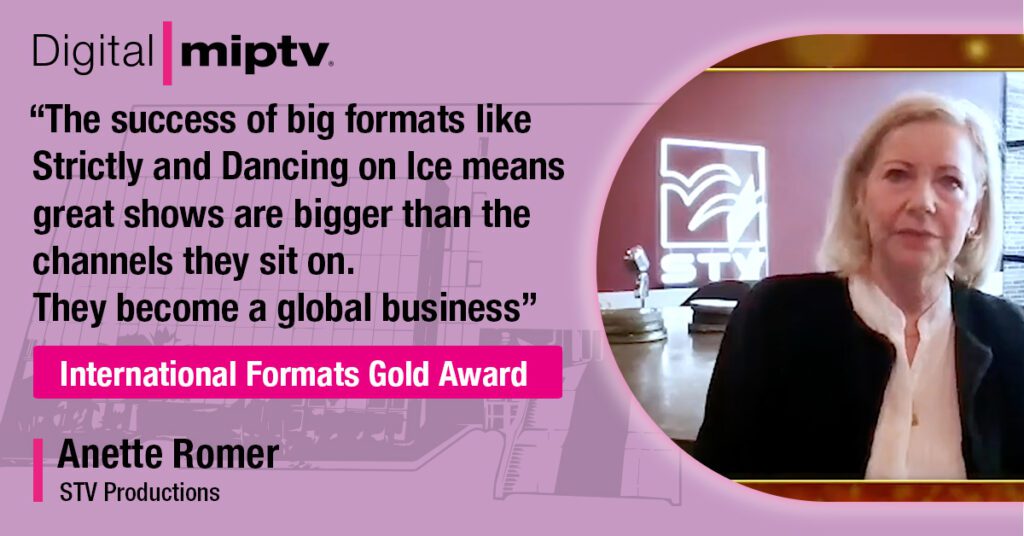
Formats veteran Anette Romer made an interesting observation when collecting her Gold Award at the International Format Awards, hosted by MipFormats, in association with FRAPA, EMC and C21Media. Speaking about her career, she said she had been struck by the scale of leading brands: “Shows like Strictly Come Dancing and The X Factor are phenomenal, they are bigger than the networks they sit on.”
While great ideas are still a strong currency in the content business, this notion of super-brands was evident across the week. Keynote speakers David Beckham and Marc Anthony are both examples of powerful brands that have been able to diversify into TV by drawing on their pre-existing audiences and networks. In this sense, they share DNA with exiled royals Harry and Meghan, who recently signed a deal with Netflix, Paul Pogba, who has linked up with Amazon, and Serena Williams who has also announced a production outfit.
In Trending Topics, a session that took place just ahead of MIPTV, branded entertainment consultant Sandra Lehner touched on the same theme by referencing star-powered production houses. “In Hollywood, it’s hard to get a project noticed without well-known people as producers, as that gets you immediate recognition.”
The Masked Singer, still a fast growing global format, is another perfect example of the brandification of TV. Like The Voice before it, it continues to grow because buyers are tapping into its pre-existing track record. With spin-offs like The Masked Dancer, it becomes a self-fulfilling prophecy of success. And remember, part of its appeal is that the process involves revealing celebrities – hidden brands. There’s an interesting story to be written about the relative success of format adaptations that use celebrities vs those that use ordinary folk.
The aggregation of investment around brands is further evident in the kids space. Warner Bros. Head Of Kids and Family Programming Amy Friedman, for example, talked about her firm’s renewed emphasis on flagship kids brand Cartoon Network: “My team has been tasked to mean more to more audiences. So we are expanding the Cartoon brand into preschool and we are focusing more on girls aged six-to-11.” So powerful is Cartoon, that Warner Bros. believes the brand can even be extended into live action: “always animated but not always cartoons.”
Diversity, Equity & Inclusion (DEI) is no longer a ‘nice to have’
Digital MIPTV hosted a session in which five diversity chiefs from Amazon, A+E Networks, Warner Bros, ITV and the BBC talked about the initiatives they are putting in place to move the needle on DEI. The clear narrative to emerge from the session is that there is no longer any excuse for not taking this subject seriously. Producers that don’t make efforts to embed DEI will not win commissions and broadcasters that fail on this score will be held accountable. No one is too big to avoid scrutiny, as Fremantle’s Neighbours discovered this week.
A key point to emerge is that DEI can no longer be led by “a coalition of the willing”. It needs to be embedded in processes. Latasha Gillespie, head of global diversity equity and inclusion at Amazon Studios, said: “For me, the biggest achievement we have made is to put structural and systematic changes in place, so that we have diverse representation in front of and behind the camera, and to ensure access for talent normally kept out of this business. I think we have pushed past good intentions by putting structures in place.”
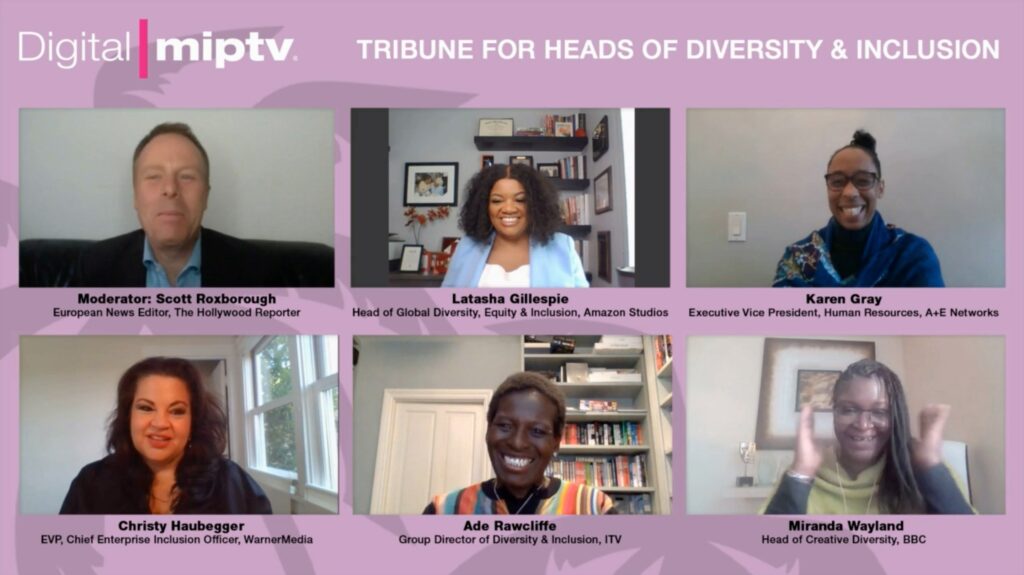
Christy Haubegger, Executive Vice-President, Chief Enterprise Inclusion Officer at WarnerMedia, made an important point about reaching out to all segments of the business. “We’ve spent a lot of time working with showrunners and development executives because it’s just as important to know how to manage and navigate DEI on set and in writers’ rooms as it is in executive offices,” she said.
Recruitment is a key area that needs attention, but ITV’s Adi Rawcliffe stressed that getting people into organisations is only the first part of the DEI process: “People have to feel like they can be their authentic selves at work. Some leaders are not good at managing difference and need to understand how micro aggressions and micro affirmations can impact the way people in a team feel.” Karen Gray, Executive Vice-President Human Resources at A+E Networks, agreed, saying that people need to be given the chance to shine on their own terms. “They weren’t just hired because of their colour or identity, so they need agency. You can’t have diverse representation without it.”
Co-creation is in the Ascendancy – for Several Reasons
Co-production and co-financing have always been important dynamics in the TV business, but there has undoubtedly been a quantum shift towards collaboration, partnership and co-creation in recent times. And there are a number of reasons why this is the case.
The most obvious is to increase financial fire power. At a time when the likes of Netflix, Amazon and Disney+ seem to have limitless budgets for high-end scripted and factual productions, sharing creative capabilities and financial risk is increasingly seen as a necessity by other players. This was a recurrent theme in the drama buyer programme briefings. Karni Ziv, head of drama and comedy at Keshet Broadcasting, is responsible for developing scripted projects destined for Israeli free-to-air channel Keshet 12. She is looking for “partners interested in working with an Israeli company representing a lot of talented Israeli creators. We are developing an Israeli-French co-pro, based on A Long Night In Paris, a spy thriller about an Israeli tech executive who disappears from Charles de Gaulle airport. We are trying to find a way of making a series that interest both audiences.”
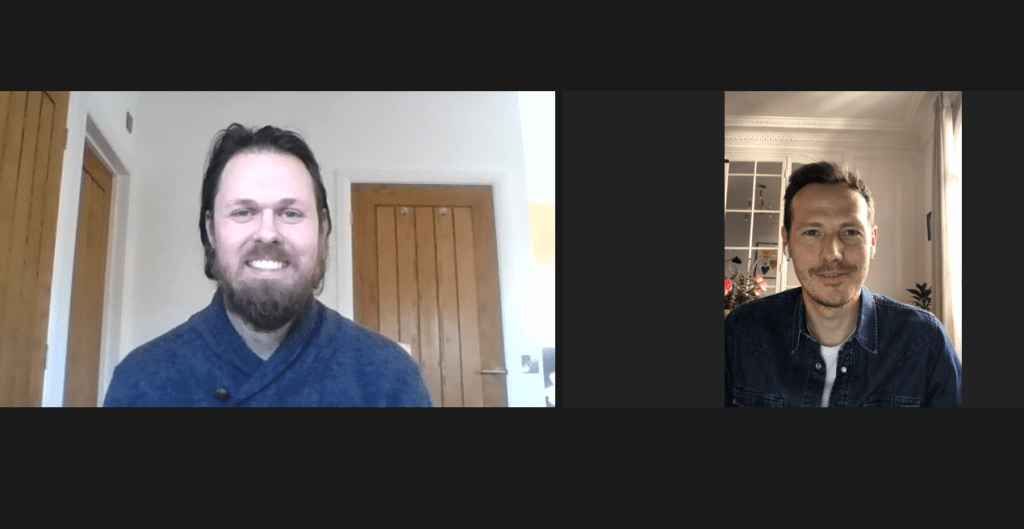
Co-creation is also increasingly seen as a way for broadcasters to hold on to some IP – rather than simply acquiring formats from third parties. TF1 Executive Vice-President, Head of Content Development Julien Degroote (right above) used his drama briefing to outline his remit and the channels he oversees. His two primary jobs are to commission local versions of international hits such as The Masked Singer, and to create/co-develop original IP with producers from France or around the world. In the latter category is District Z, created by Sony joint venture Satisfaction.
Another powerful driver of co-creation is the fusion of different skillsets. Both the David Beckham and Marc Anthony keynotes underline the point. Here, we see the combination of proven talent/storytellers with industry experts that know how to bring creative visions to the screen – for example Viacom International Studios’ recent first-look deal with Anthony’s Magnus Studios.
Collaboration is also important in achieving access to markets. Nippon TV in Japan has been brimming over with ideas for years – and has recognised that the best way to get them to the global market is via partnerships. It did this in the scripted genre by working with Turkish producers; and it is also enjoying success in formats through creative collaborations. A high-profile MIPTV launch, for example, was Stacking It!, a format created through a co-development deal with ITV Studios. Nippon TV’s Tom Miyauchi said: “It originated from our creator Keita Ono‘s crazy idea about families stacking everyday items from their homes to win prizes. Then, working with ITV Studios we elevated it to the next level as a studio game show on a global scale. Both parties are extremely committed to creating a new format in a new way.”
Co-creation also works when parties have complementary agenda – evident in the growth of content marketing. Here brands are seeking to sell products and producers are pursuing production fees and IP.
Kids mental health – the next CSR priority for the global TV industry?
From babies born in lockdown to hungry primary school kids to university students imprisoned in halls of residence, the pandemic has been tough on kids. And that’s without even thinking about social media-fuelled anxiety, identity, financial inequality vs baby boomers, the endemic use of drugs and the impending destruction of the planet.
Most of these issues were evident in the programming presented by The Wit during its Kids & Young Adult Fresh TV. And there were also echoes of it in the factual TV trends presentation by K7 Media’s David Ciaramella. He noted a trend towards docs that “seek understanding” on issues such as mental health, wealth, illness or sustainability.
While younger kids tend to get the support they need via broadcaster initiatives, there’s still a sense that older kids and young adults are viewed as a target audience that needs to be squeezed – linear TV’s coveted demographic for ad revenue, SVOD’s next cash cow, mobile’s biggest data users, social media’s most impressionable audience. Possibly, TV needs its own Greta Thunberg, someone who can drive the kids mental health agenda as effectively as the current DEI agenda. While most of the UN’s Sustainable Development Goals are not kid-specific, there’s no question young people bear the brunt of societal failings. Maybe it’s time for a MIP Advisory Board made up of people aged 16-20, who can tell industry stakeholders how they really feel.
There is Pent-Up Demand for Face-to-Face Meetings
The TV industry has done a remarkable job of staying afloat throughout the pandemic. In part, this is down to the systems and protocols that have enabled physical production to resume all around the world. But it has also been the result of adept use of digital tools – everything from VFX to video conferencing. Zoom, of course, has been used for everything from casting and development through to deal-making and distribution. Digital MIPTV, for example, would have been impossible without access to this kind of technology. Imagine trying to do all this back in the 1980s with fax and landlines…
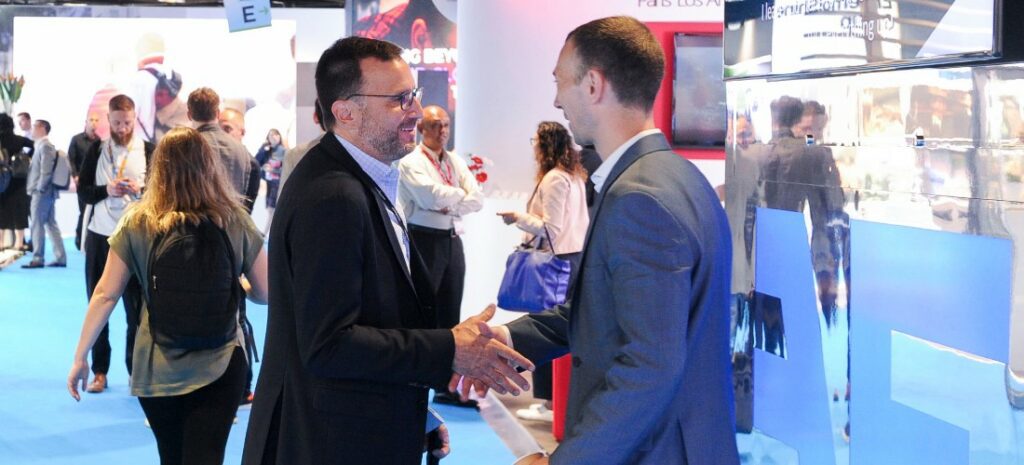
But it’s evident that people are ready to get out and meet each other again. Many executives talk of Zoom fatigue and the challenges involved in balancing their work and home life. There is also a genuine sense that some of the best ideas come via random networking, accidental meetings and snatched conversations in the corridor. While the pandemic has clearly accelerated the use of digital tech as a way to create business efficiencies, expect there to be strong demand for physical meetings when conditions allow. See you at MIPCOM!
That’s a wrap for Digital MIPTV’s live week! All sessions remain available until May 14, via www.miptv.com. Enjoy!

